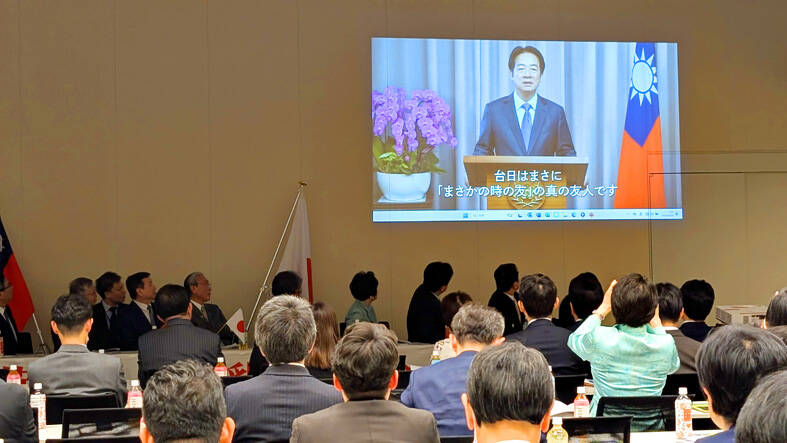Japan must prevent a Taiwan contingency from happening, a group of pro-Taiwan Japanese lawmakers from multiple political parties said in a joint resolution on Wednesday.
Tokyo must do all in its power to avert a conflict in the Taiwan Strait, Japanese lawmakers said in the annual agenda of the Japan-ROC Diet Members’ Consultative Council.
A Taiwan contingency is a Japan contingency, the lawmakers said, echoing a phrase coined by former Japanese prime minister Shinzo Abe.

Photo: Lin Tsuei-yi, Taipei Times
Japanese Representative Keiji Furuya, who heads the council, said Japanese lawmakers are already working on organizing an in-person security summit between Taiwan, Japan and the US.
The meeting can take place in person, as the COVID-19 pandemic is no longer an issue, unlike the past two summits, he said.
The council would send a delegation to attend Double Ten National Day events this year, as is customary, Furuya said.
This year’s trilateral summit is tentatively scheduled to take place in Taiwan sometime during the summer, ahead of Japan’s House of Representatives elections, Sankei Shimbun reported.
Japan should continue supporting Taiwan’s bid to join international organizations, including Interpol, the World Health Assembly, the International Civil Aviation Organization and the Comprehensive and Progressive Agreement for Trans-Pacific Partnership, they said.
The lawmakers also voted to establish a Taiwan-Japan economic exchange project team aimed at boosting bilateral trade and promoting pop culture exchanges including anime and manga, they said.
President William Lai (賴清德) in a video recording thanked the Japanese lawmakers for their support by allowing Taiwan to be listed as place of origin in Japan’s household registration system.
Lai highlighted shared challenges, including a shifting geopolitical landscape, climate change and economic uncertainty, adding that Taiwan and Japan could weather the storm only by cooperating “hand-in-hand and heart-to-heart.”
“We hope, in the face of expanding authoritarianism, to work closely with Japan to jointly build non-red supply chains,” he said.
“We hope to stand firmly together to exert our strength as we collectively safeguard our democratic values and promote regional peace, stability and prosperity,” he added.
The council’s influence has ebbed and waned from a height of more than 300 members to a nadir of 188.
The council’s current membership is 288, making it one of the largest all-party groups in the Diet.
Japan’s top representative to Taiwan yesterday said that both sides need to work closely to respond to economic and security challenges brought by US President Donald Trump’s new administration.
At an event in Taipei to mark the 15th anniversary of the establishment of the Taiwan Society of Japan Studies, Japan-Taiwan Exchange Association Taipei Office Chief Representative Kazuyuki Katayama said deepening Japan-Taiwan economic and technological cooperation has attracted increasing global attention.
Japanese companies and their Taiwanese counterparts have “inseparable connections” spanning mutual investments, research and development, and talent exchanges, Katayama said.
Japan and Taiwan face mutual security and economic challenges due to an increasingly complex global situation and East Asia policies “that deserve careful evaluation” from the Trump White House.
This means Japan and Taiwan need more “sophisticated responsive measures,” he said.

Seventy percent of middle and elementary schools now conduct English classes entirely in English, the Ministry of Education said, as it encourages schools nationwide to adopt this practice Minister of Education (MOE) Cheng Ying-yao (鄭英耀) is scheduled to present a report on the government’s bilingual education policy to the Legislative Yuan’s Education and Culture Committee today. The report would outline strategies aimed at expanding access to education, reducing regional disparities and improving talent cultivation. Implementation of bilingual education policies has varied across local governments, occasionally drawing public criticism. For example, some schools have required teachers of non-English subjects to pass English proficiency

‘FORM OF PROTEST’: The German Institute Taipei said it was ‘shocked’ to see Nazi symbolism used in connection with political aims as it condemned the incident Sung Chien-liang (宋建樑), who led efforts to recall Democratic Progressive Party (DPP) Legislator Lee Kun-cheng (李坤城), was released on bail of NT$80,000 yesterday amid an outcry over a Nazi armband he wore to questioning the night before. Sung arrived at the New Taipei City District Prosecutors’ Office for questioning in a recall petition forgery case on Tuesday night wearing a red armband bearing a swastika, carrying a copy of Adolf Hitler’s Mein Kampf and giving a Nazi salute. Sung left the building at 1:15am without the armband and apparently covering the book with a coat. This is a serious international scandal and Chinese

TRADE: The premier pledged safeguards on ‘Made in Taiwan’ labeling, anti-dumping measures and stricter export controls to strengthen its position in trade talks Products labeled “made in Taiwan” must be genuinely made in Taiwan, Premier Cho Jung-tai (卓榮泰) said yesterday, vowing to enforce strict safeguards against “origin laundering” and initiate anti-dumping investigations to prevent China dumping its products in Taiwan. Cho made the remarks in a discussion session with representatives from industries in Kaohsiung. In response to the US government’s recent announcement of “reciprocal” tariffs on its trading partners, President William Lai (賴清德) and Cho last week began a series of consultations with industry leaders nationwide to gather feedback and address concerns. Taiwanese and US officials held a videoconference on Friday evening to discuss the

PERSONAL DATA: The implicated KMT members allegedly compiled their petitions by copying names from party lists without the consent of the people concerned Judicial authorities searched six locations yesterday and questioned six people, including one elderly Chinese Nationalist Party (KMT) member and five KMT Youth League associates, about alleged signature forgery and fraud relating to their recall efforts against two Democratic Progressive Party (DPP) legislators. After launching a probe into alleged signature forgery and related fraud in the KMT’s recall effort, prosecutors received a number of complaints, including about one petition that had 1,748 signatures of voters whose family members said they had already passed away, and also voters who said they did not approve the use of their name, Taipei Deputy Chief Prosecutor